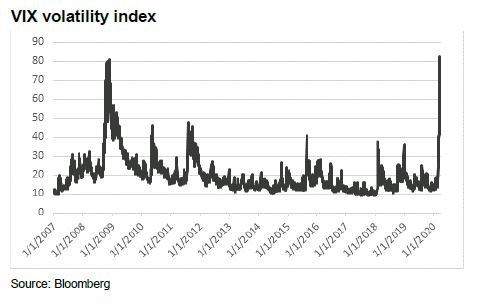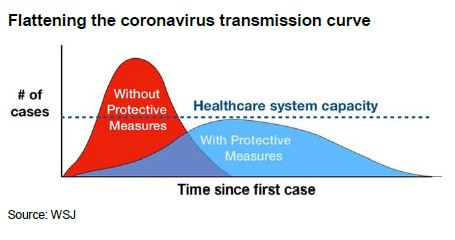Research Report on Corona: What investors should pay attention to
The pandemic is causing market disruption and the outlook is uncertain. Three criteria now need to be considered by investors.

Finally, it's a pandemic: On 11 March, the WHO finally declared the global viral outbreak to be a pandemic, which, in our view, came at a rather late point in time. The WHO mentioned that “pandemic is not a word to use lightly or carelessly. Just a few hours after the announcement, the US closed its borders to most of Europe, stock markets plummeted and volatility soared.

Healthcare systems put to the test
Harsher containment and mitigation measures are also needed, to avoid healthcare systems from collapsing, as we are witnessing in Italy. While these measures are not aimed at stopping the pandemic – it is too late for that – they should at least spread the outbreak over a longer period of time.

In this way, the number of patients needing a hospital bed can potentially be accommodated with the healthcare system capacities of each individual country.
Spring fever – likely not too much of it this year
According to our interview with a key opinion leader it is fair to assume, that the seasonality will likely only have a minor effect on the outbreak – too many people have no immunity providing an optimal environment for the virus to continue to spread.
The only way to get in control again is to have a vaccine. Novel methods of vaccine development fuel hopes that one will be available in 12-18 months.
While we are also hopeful, we also want to caution that these novel methods have thus far never brought forward a human vaccine. And, should it actually work, we assume a 12-18-month timeline is plausible only if everything falls just into place perfectly.
What it means for investors
It is always very difficult to redeploy valuable cash during a major crisis and market disruption. For those able and willing to invest, we would point out three criteria when looking at what to buy:
1. Strong balance sheets
We would strongly focus on companies with strong balance sheets. We would define this as companies with relatively little or no debt that can continue to invest into their business. Furthermore, one should also consider the liquidity of the balance sheet. We would define this as balance sheets with much of the equity in assets, which are cash-like.
2. Strong business models
We like strong business models and very strong (niche) positions. During and post crisis, we are convinced that the strong will get stronger while the weak will get weaker.
3. Companies that create value
Companies that create value i.e. have the ability to invest at returns exceeding their cost of capital over the long-term. The big advantage with these companies is that, by consistently generating (shareholder) value, their intrinsic value increases over time. It also takes some pressure off to find the “perfect” timing to buy, as time should be on the side of investors in the longer term.
